 |
|||||
|
|||||
| Preview of Stamps Catalogue: VOLUME 1 |
 |
|||||
|
|||||
| Preview of Stamps Catalogue: VOLUME 1 |
Return To Catalogue - France overview
Note: on my website many of the
pictures can not be seen! They are of course present in the catalogue;
contact me if you want to purchase it.
1 c green 1 c black on blue 2 c green 2 c brown on yellow 3 c brown 3 c grey 4 c green 4 c brown on grey 5 c dark green 5 c light green 10 c green 10 c black on lilac 15 c grey 15 c blue 20 c brown on yellow 20 c red on green 25 c blue 25 c black on red 25 c brown on yellow 30 c brown 35 c brown on yellow 40 c red on yellow 50 c red 75 c red 75 c lilac on orange 1 F olive 2 F brown on blue 5 F violet

(5 F red)
A 5 F red was issued in 1925 for a philatelic exhibition in Paris in a miniature sheet:

(Miniature sheet for the Stamp Exhibition of 1925 with four 5 F
stamps, reduced size)


(The two types)
Two types of these stamps exist: Type I; the very small inscription at the bottom has the 'N' of 'INV' below the 'B' of 'REPUBLIQUE'; Type II: the 'N' of 'INV' is below the 'U' of 'REPUBLIQUE'. Not all stamps have been issued in both types. Specialists distinguish a 1 c black on very intense blue (blue de Prusse) variety which is quite valuable. A prepared non-issued 20 c blue on blue (type I) exists.

Genuine 'Blue de Prusse' or 1 c black on intense blue variety
All the stamps are perforated 14 x 13 1/2.
Value of the stamps |
|||||
vc = very common c = common * = not so common ** = uncommon |
*** = very uncommon R = rare RR = very rare RRR = extremely rare |
||||
| Type I | Type II | ||||
| Value | Unused | Used | Unused | Used | Remarks |
| 1 c green | *** | *** | |||
| 1 c black on blue | c | vc | black on intense blue: RRR | ||
| 2 c green | RR | R | *** | ** | |
| 2 c brown on yellow | c | vc | |||
| 3 c brown | *** | *** | |||
| 3 c grey | * | c | |||
| 4 c green | R | R | |||
| 4 c brown on grey | * | c | |||
| 5 c green | R | *** | * | vc | Shades of green |
| 10 c green | R | ** | RR | R | |
| 10 c black on lilac | ** | c | ** | vc | |
| 15 c grey | RR | ** | R | c | |
| 15 c blue | * | vc | Exist on paper with crossed background lines: vc | ||
| 20 c brown on yellow | *** | * | |||
| 20 c red on green | ** | c | |||
| 25 c blue | RRR | *** | R | vc | Shades of colour |
| 25 c black on red | * | vc | |||
| 25 c brown on yellow | R | c | |||
| 30 c brown | RR | * | *** | c | |
| 35 c brown on yellow | RR | ** | |||
| 40 c red on yellow | RR | * | *** | c | |
| 50 c red | R | * | *** | vc | |
| 75 c red | RR | * | RR | *** | |
| 75 c lilac on orange | *** | ** | |||
| 1 F | RR | * | *** | c | |
| 2 F brown on blue | *** | ** | |||
| 5 F violet | RR | *** | |||
| 5 F red (1925) | R | R | |||
These stamps, but imperforated, were issued for the french colonies. These stamps surcharged with "CENTIMOS" were issued for french Morocco. Surcharged with "PIASTRE" they were used for the french post offices in Turkey. Those surcharged with "ANNA" were used in Zanzibar.
Reprints:
Imperforate reprints exists in type II. The non-issued 20 c blue on blue was also reprinted and exists with forged perforation.
Millesime:
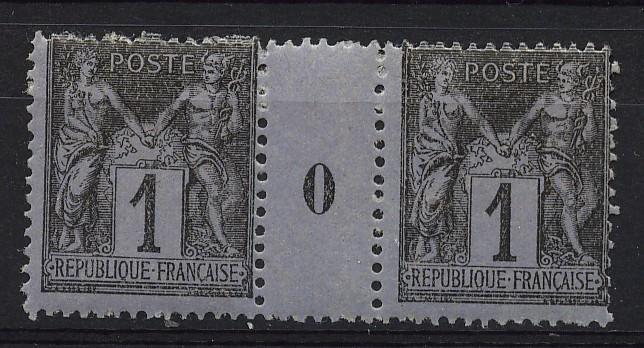
1 c with so-called 'Millesime': small piece of paper between two
stamps. The "0" refers to the last digit of the year,
so probably 1880 or 1890 here.
Cancels:


Special cancellations '11' and '120' in a circle
I have seen many of the above cancels; a small circle with a number inside (also on later issues). I don't know what they were used for. If anybody has more information please contact me! I have seen the numbers: 1, 2, 11, 13, 22, 49, 53 and 120.
They resemble a lot the 'Origine Rurale' cancels, or 'OR' in a small circle, example:

("OR" in a small circle)

red cancel
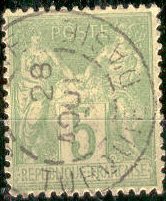
(A stamp used in Turkey)

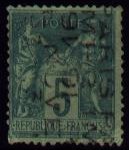
These stamps exists precancelled (see images above), but are very rare. Forged overprints exist, example:
Some surcharges were made for Majunga (Madagascar) and Madagascar:
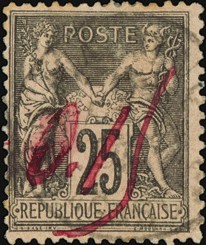



Local Majunga (Madagascar) surcharges
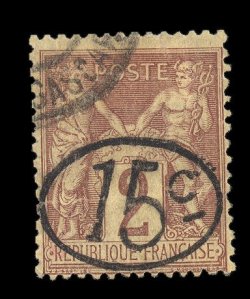
Madagascar surcharge in an ellipse; the values 5 c on 1 c black
,15 c on 2 c brown on yellow, 25 c on 3 c grey, 25 c on 4 c brown
on grey and 25 c on 40 c orange on yellow exist.
Postal forgery:
A postal forgery of the 15 c blue stamp was made in St. Etienne in 1886; the so-called 'faux de Chalon'. They seem to have been made by mrs. Conry, Rolle and Mugnier. Examples:


(Chalon forgery left, genuine stamp right)
The Chalon forgery has the perforation in the corners different (it doesn't 'match'). The finer details are lost in this forgery. The 'O' of 'POSTE' is more oval than in the genuine stamps. The dots before and after "REPUBLIQUE FRANCAISE: are full and not hollow as in the genuine stamps. The picture of this forgery was found on the website: http://home.nordnet.fr/~hcantineau/faux_chalon.htm. More information on these forgeries can be found there (in French).
Other forgeries:

(Genuine envelope with two forged 5 F stamps added and forged
cancels, reduced size)
The forgeries made by someone in Hialeah, Florida (USA) are usually not very dangerous. They are poorly made forgeries offered as such on E-bay. They are probably made by using a scanner and printer. However, recently (August 2003) he also starts offering genuine envelopes, decorated with his forgeries and with forged cancels added! The above example is such a genuine envelope, with two forged 5 F stamps added, a forged "3122" numeral cancel and two mute cancels.
Another recent forgery of the 5 F exhibition stamp, made by Peter Winter (in the 1980's):
The word "FAUX" is printed in the lower left corner. This forgery also exists misperforated (with extra large margins left or right) and uncancelled. I've also seen the whole exhibition sheet forged (probably from the same source).

Another forgery with bad perforation.
Private (?) reprints:
I have seen a minisheet with two (private?) reprints of the 5 F violet stamp. They were issued in 1939 for the "EXPOSITION PHILATELIQUE" in Montpellier. One has a cancel "MONTPELLIER 4e/7 JUIN 78 HERAULT" and the other "MONTPELLIER 15e/28 DEC 98 HERAULT". One half is shown above.



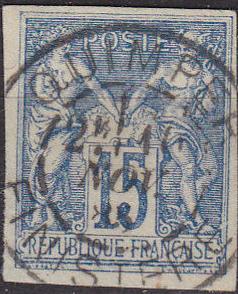
Postal stationery in the same design; 5 c green. Sometimes these
'cuts' from envelopes or postcards are confused with imperforate
stamps or French colonies stamps. The
following values exist 1 c black, 2 c brown, 3 c red, 5 c green,
10 c black, 15 c blue, 25 c black, 50 c red (pneumatic mail), 75
c black.

"TAXE REDUITE" on a 50 c to be used on the pneumatic
tube mail system in Paris.